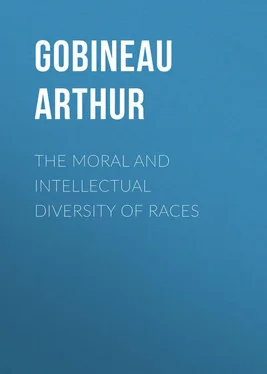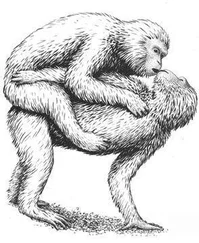Arthur Gobineau - The Moral and Intellectual Diversity of Races
Здесь есть возможность читать онлайн «Arthur Gobineau - The Moral and Intellectual Diversity of Races» — ознакомительный отрывок электронной книги совершенно бесплатно, а после прочтения отрывка купить полную версию. В некоторых случаях можно слушать аудио, скачать через торрент в формате fb2 и присутствует краткое содержание. Жанр: История, foreign_antique, foreign_prose, на английском языке. Описание произведения, (предисловие) а так же отзывы посетителей доступны на портале библиотеки ЛибКат.
- Название:The Moral and Intellectual Diversity of Races
- Автор:
- Жанр:
- Год:неизвестен
- ISBN:нет данных
- Рейтинг книги:4 / 5. Голосов: 1
-
Избранное:Добавить в избранное
- Отзывы:
-
Ваша оценка:
- 80
- 1
- 2
- 3
- 4
- 5
The Moral and Intellectual Diversity of Races: краткое содержание, описание и аннотация
Предлагаем к чтению аннотацию, описание, краткое содержание или предисловие (зависит от того, что написал сам автор книги «The Moral and Intellectual Diversity of Races»). Если вы не нашли необходимую информацию о книге — напишите в комментариях, мы постараемся отыскать её.
The Moral and Intellectual Diversity of Races — читать онлайн ознакомительный отрывок
Ниже представлен текст книги, разбитый по страницам. Система сохранения места последней прочитанной страницы, позволяет с удобством читать онлайн бесплатно книгу «The Moral and Intellectual Diversity of Races», без необходимости каждый раз заново искать на чём Вы остановились. Поставьте закладку, и сможете в любой момент перейти на страницу, на которой закончили чтение.
Интервал:
Закладка:
"In China," says M. Huc, "there are not, as in Europe, public libraries and reading-rooms; but those who have a taste for reading, and a desire to instruct themselves, can satisfy their inclinations very easily, as books are sold here at a lower price than in any other country. Besides, the Chinese find everywhere something to read; they can scarcely take a step without seeing some of the characters of which they are so proud. One may say, in fact, that all China is an immense library; for inscriptions, sentences, moral precepts, are found in every corner, written in letters of all colors and all sizes. The façades of the tribunals, the pagodas, the public monuments, the signs of the shops, the doors of the houses, the interior of the apartments, the corridors, all are full of fine quotations from the best authors. Teacups, plates, vases, fans, are so many selections of poems, often chosen with much taste, and prettily printed. A Chinese has no need to give himself much trouble in order to enjoy the finest productions of his country's literature. He need only take his pipe, and walk out, with his nose in the air, through the principal streets of the first town he comes to. Let him enter the poorest house in the most wretched village; the destitution may be complete, things the most necessary will be wanting; but he is sure of finding some fine maxims written out on strips of red paper. Thus, if those grand large characters, which look so terrific in our eyes, though they delight the Chinese, are really so difficult to learn, at least the people have the most ample opportunities of studying them, almost in play, and of impressing them ineffaceably on their memories." — A Journey through the Chinese Empire , vol. i. pp. 327-328.
14
Is it necessary to call to the mind of the reader, that the most prominent physicians, the greatest chemists, the best mathematicians, were French, and that to the same nation belong the Comptes, the De Maistres, the Guizots, the De Tocquevilles; or that, notwithstanding its political extravaganzas, every liberal theory was first fostered in its bosom? The father of our democratic party was the pupil of French governmental philosophy, by the lessons of which even his political opponents profited quite as much as by its errors.
15
Brace, in his Home Life in Germany , mentions an instance of this kind, but not having the volume at hand, I cannot cite the page. To every one, however, that has travelled in Europe, or has not, such facts are familiar. It is well known, for instance, that in some of the most polished European countries, the wooden ploughshare is still used; and that, in Paris, that metropolis of arts and fashion, every drop of water must be carried, in buckets, from the public fountains to the Dutchess' boudoir in the first, and to the Grisette's garret in the seventh story. Compare this with the United States, where – not to mention Fairmount and Croton – the smallest town, almost, has her water-works, if required by her topography. Are we, then, so infinitely more civilized than France?
16
Since writing the above, I lit upon the following striking confirmation of my idea by Dr. Pickering, whose analogism here so closely resembles mine, as almost to make me suspect myself of unconscious plagiarism. "While admitting the general truth, that mankind are essentially alike, no one doubts the existence of character, distinguishing not only individuals, but communities and nations. I am persuaded that there is, besides, a character of race. It would not be difficult to select epithets; such as 'amphibious, enduring, insititious;' or to point out as accomplished by one race of men, that which seemed beyond the powers of another. Each race possessing its peculiar points of excellence, and, at the same time, counterbalancing defects, it may be that union was required to attain the full measure of civilization. In the organic world, each field requires a new creation; each change in circumstances going beyond the constitution of a plant or animal, is met by a new adaptation, until the whole universe is full; while, among the immense variety of created beings, two kinds are hardly found fulfilling the same precise purpose. Some analogy may possibly exist in the human family; and it may even be questioned, whether any one of the races existing singly would, up to the present day, have extended itself over the whole surface of the globe." — The Races of Man, and their Geographical Distribution. By Charles Pickering, M. D. Boston, 1811. ( U. S. Exploring Expedition , vol. ix. p. 200.)
17
Since Champollion's fortunate discovery of the Rosetta stone, which furnished the key to the hieroglyphics, the deciphering of these once so mysterious characters has made such progress, that Lepsius, the great modern Egyptologist, declares it possible to write a minute court gazette of the reign of Ramses II., the Sesostris of the Greeks, and even of monarchs as far back as the IVth dynasty. To understand that this is no vain boast, the reader must remember that these hieroglyphics mostly contain records of private or royal lives, and that the mural paintings in the temples and sepulchral chambers, generally represent scenes illustrative of trades, or other occupations, games, etc., practised among the people of that early day.
18
Ethnological Journal , edited by Luke Burke, London, 1848; June 1, No. 1, from Types of Mankind . By Nott and Gliddon, p. 49.
19
From Types of Mankind . By Nott and Gliddon, p. 52.
20
The term "race" is of relative meaning, and, though often erroneously used synonymously with species , by no means signifies the same. The most strenuous advocates of sameness of species, use it to designate well-defined groups, as the white and black. If we consider ourselves warranted by the language of the Bible, to believe in separate origins of the human family, then, indeed, it may be considered as similar in meaning to species; otherwise, it must signify but subdivisions of one. We may therefore speak of ten or a hundred races of man, without impugning their being descended from the same stock. All that is here contended for is, that the distinctive features of such races, in whatever manner they may have originated, are now persistent. Two men may, the one arrive at the highest honors of the State, the other, with every facility at his command, forever remain in mediocrity. Yet, these two men may be brothers.
That the question of species, when disconnected from any theological bearing, is one belonging exclusively to the province of the naturalist, and in which the metaphysician can have but a subordinate part, may be illustrated by a homely simile. Diversity of talent in the same family involves no doubt of parentage; but, if one child be born with a black skin and woolly hair, questions about the paternity might indeed arise.
21
Natural History of the Varieties of Man. By Robert Gordon Latham. London, 1850.
22
The collision between these two nationalities, only a few years ago, was attended by scenes so revolting – transcending even the horrors of the Corcyrian sedition, the sack of Magdeburg, or the bloodiest page in the French Revolution – that, for the honor of human nature, I would gladly disbelieve the accounts given of them. But the testimony comes from neutral sources, the friends of either party being interested in keeping silence. I shall have occasion to allude to this subject again, and therefore reserve further details for a note in the body of the work.
23
Интервал:
Закладка:
Похожие книги на «The Moral and Intellectual Diversity of Races»
Представляем Вашему вниманию похожие книги на «The Moral and Intellectual Diversity of Races» списком для выбора. Мы отобрали схожую по названию и смыслу литературу в надежде предоставить читателям больше вариантов отыскать новые, интересные, ещё непрочитанные произведения.
Обсуждение, отзывы о книге «The Moral and Intellectual Diversity of Races» и просто собственные мнения читателей. Оставьте ваши комментарии, напишите, что Вы думаете о произведении, его смысле или главных героях. Укажите что конкретно понравилось, а что нет, и почему Вы так считаете.












